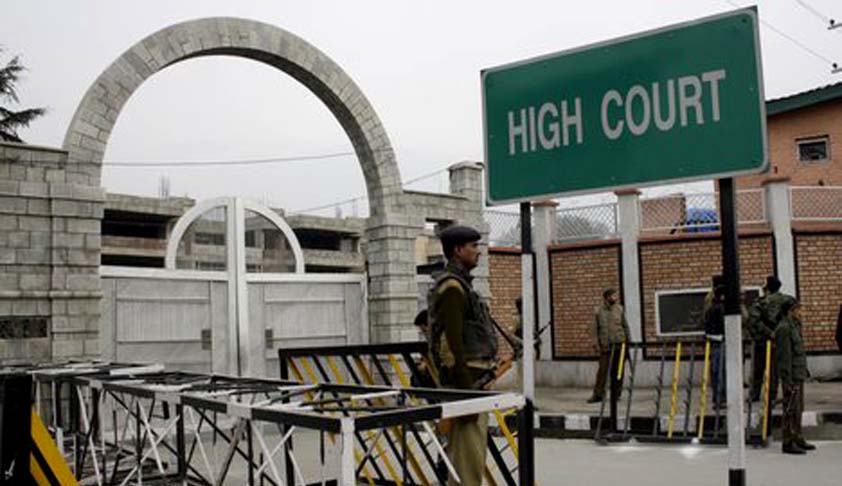Mohinder Verma
JAMMU, May 27: The High Court of Jammu & Kashmir and Ladakh has held that non-communication of entry below the benchmark recorded in the Annual Confidential Reports (ACRs) of the Government servants is violative of Article 14 of the Constitution of India and fundamental principles of natural justice.
Moreover, when the entry is communicated to officer he should have the right to make a representation against such entry and representation should be decided by an authority higher than the one who made the entry within a reasonable period and in a fair manner.
This significant judgment has been delivered by Justice Wasim Sadiq Nargal while issuing directions for granting promotion to the petitioner-Ashok Kumar Sharma as Additional DIG BSF retrospectively from the date the benefit has been given to his juniors with higher pension and balance of arrears of pay.
The petitioner, who had unblemished meritorious service to his credit, was not considered for promotion as Additional DIG BSF twice by the Departmental Promotion Committee on the ground that ACR for some years was downgraded as such he approached the High Court seeking quashment of orders dated 80.4.2002 and 21.04.2003 whereby respondents were promoted to the post of Additional DIG and further seeking direction for promoting him to the post of Additional DIG with effect from the date his juniors were promoted.
After hearing counsels for the petitioner and respondents, Justice Wasim Sadiq Nargal observed, “the performance of every Government servant is assessed annually through his Confidential Report, which is an important document providing the basic and vital inputs for assessing the performance of the Government servant and for assessing his suitability for his further advancement in his career on occasions like confirmation, promotion, crossing of efficiency bar, selection for deputation and selection for foreign assignment etc”.
The issues which arise for consideration before this court are whether downgrading of Annual Confidential Reports for the year 1997-1998 and 1998-1999 from “Outstanding” to “Good” and “Very Good” to “Good” falls within the ambit of adverse remarks and whether under law the respondents were required to communicate the remarks to the petitioner, Justice Nargal said.
“The perusal of the original record reveals that downgraded ACR was never communicated to the petitioner nor there is any specific stand taken by the respondents in the counter affidavit that the ACR was ever communicated to the petitioner”, High Court said, adding “rather, the respondents have taken a stand that ACR which has been downgraded to “Good” does not fall within the ambit of adverse remarks and thus, there was no requirement under law to communicate the same to the petitioner”.
“I do not agree with the stand taken by the respondents in the counter affidavit that downgrading of the ACR from “Outstanding” to “Good” fall outside the purview of adverse remarks. Rather, a duty was cast upon the respondents to have communicated the downgraded ACR to the petitioner which in a way has denied the promotion to the petitioner”, Justice Nargal said.
Had the petitioner been given an opportunity to file the representation against the downgraded ACR, then perhaps the petitioner would have become eligible for promotion to the post of Additional DIG. Thus, action of the respondents in not giving an opportunity of being heard to the petitioner has violated the right of being considered for promotion to the post of Additional DIG along with other eligible officers, High Court said while dubbing the issue of non-communication of the downgraded entry to the petitioner as arbitrary and violative of the principles of natural justice.
Pointing towards various judgments of the Supreme Court, Justice Nargal held that downgrading of the ACR from “Outstanding” to “Very Good” and “Very Good” to “Good” falls within the ambit of adverse remarks in the present case and the adverse remarks were required to be communicated to the petitioner so that he would have got an opportunity to make a representation against such adverse remarks.
High Court also placed reliance on communication of Ministry of Home Affairs regarding recording of adverse remarks in ACRs and downgrading of the grading by Reviewing Officer/Accepting Authority. In the communication, a direction has been issued by the Home Secretary that the assessment by the concerned Reviewing/ Accepting Authorities should be impartial and objective in case such authorities decide to down/upgrade the grading given by the Reporting Officer, sufficient reasoning must be duly given/recorded.
“Thus, the action of the respondents in the present case was bereft of any reasoning and the same was in violation of their own policy framed regarding the recording of the adverse remarks”, High Court said.
Accordingly, Justice Nargal held that non-communication of the entry “below” the Benchmark recorded in the ACRs is violative of Article 14 of the Constitution of India and also violates fundamental principles of natural justice and the policy framed by the respondents, which cannot sustain the test of law and liable to be set aside.
“I am supported by the law laid down by the Supreme Court that “Good” entry is in fact an adverse entry as it forecloses the chance of a candidate from being considered for promotion”, Justice Nargal said.
Accordingly, Justice Nargal directed the respondents that the “Good” entry be communicated to the petitioner within a period of one month from the date of receipt of the copy of this judgment. “On being communicated the entry, the petitioner may make a representation, if he so chooses, against the entry within one month and the representation will be decided within one month thereafter”, High Court said, adding “if the entry of the petitioner is upgraded, the petitioner shall be considered for promotion retrospectively by the DPC (Departmental Promotion Committee) within two months thereafter and if the petitioner gets selected for promotion retrospectively, he should be given higher pension with arrears of pay”.
Trending Now
E-Paper


